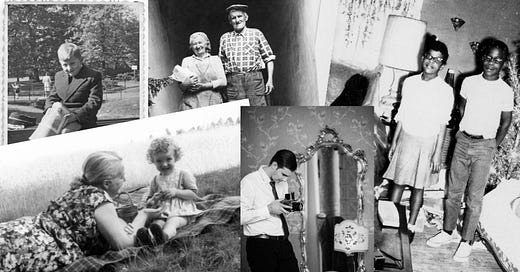Good Old Times.
I remember my grandma's perspective whenever any of us - her children, grandchildren, anyone really - would talk about our problems. "You have problems? What problems do you have? You've got everything: washing machines, dishwashers, everyone has a car, you have a roof over your head, full fridges, and you waste plenty of food." This came from someone who lived through war, couldn't finish high school because of it, who hid in the woods and picked mushrooms just to have something to eat.
Life was hard. But on many levels - also easier.
For years, her words made me feel guilty whenever I struggled. I'd think, "People are starving somewhere, and here I am complaining about my 'first-world problems.'" But I've come to realize that diminishing our struggles doesn't serve anyone.
Life isn't easier now – it's just different, with challenges that would have been unimaginable in my grandmother's time.
Where she once had to navigate physical survival, we face a different kind of wilderness. Every day, we have to filter reality on our own, as the old structures - politics, media, schools, churches - have lost their authority. Anyone can broadcast their truth, and we're left wondering what to believe. We're overfed with life hacks, but still starved for meaning. We desperately try to control what we can because so much feels beyond our control.
A Different Kind of Scarcity
On paper, it makes no sense.
We have the best education, healthcare, food, safety, and security in history, yet so many people are miserable. I keep seeing it: successful, educated people choosing to opt out of careers, relationships, even having children. Not because they can't manage these things, but because they're no longer sure why they should.
Check the below: 14 million views.
The metrics we inherited for measuring a good life don't capture our current reality. We're drowning in information, knowledge, and entertainment, yet people feel more lost than ever. We're dissecting, analyzing, and optimizing everything, but we're overwhelmed, tired, and confused about how to actually live.
What went wrong? We've created a world that prioritizes the mind while neglecting the heart. We've become masters of analysis and optimization, breaking everything down into measurable chunks. Don't misunderstand – I value data and empiricism. But we've lost something essential: the ability to embrace uncertainty, to be vulnerable in a world that increasingly demands perfection.
The Problem with Wellbeing
I hate the term "wellbeing."
What the fuck is "wellbeing"?
No one says their goal is more wellbeing - it's lukewarm, uninspiring, like floating in a sensory deprivation tank. Humans need challenge and adventure. And more Awe. We've tamed that spirit so much that we've lost it, becoming cogs in a machine, obsessed with productivity, optimization, measurements, smart goals - none of which fosters any real sense of aliveness or connection. I feel like we need more smart, collective "rewilding".
Finding Our Way Back
Connection and meaning. That's what we're missing.
We're all living in our own bubbles, our experiences carefully curated by algorithms that know our preferences better than we do. But when we share in something larger - whether it's planting trees, cooking together, or the shared triumph of group fitness - suddenly we feel part of something bigger.
These shared experiences are what we're starving for. While our phones feed us perfectly matched content, our souls long for real human connection.
We need fewer optimization apps and more opportunities to experience awe together – whether through art, nature, physical challenges, or creating something as a community.
Failing or Succeeding? Depends On What You Measure.
Imagine measuring success differently. There’s a country that does! It’s Bhutan, with its Gross National Happiness Index.
What if we valued the depth of our connections as much as our bank accounts?
What if workplaces recognized that vulnerability matters as much as productivity?
The discontent in our society isn't ingratitude for our prosperity – it's a signal that we're ready for something more.
We need the courage to rewild our imagination, to break free from our optimization addiction, and to rebuild communities around experiences that remind us what it means to be fully human.
My grandmother's generation knew hunger; ours knows emptiness. Both need to be acknowledged, and both need to be addressed.
Tell me what you think! Or just stop by to say “hi”.
Stay well, Fellow Human!






I want to make tea for you. Boss, subordinate.
How about a video with a friend? ?
I spoke once to someone who was born in the 1920s in Scotland. He said, life used to be simpler, but harder. There were fewer choices for you, and many of those led to a hard life. But now, he said, life is easier and a lot more complicated. Now today, I think it is super-easy for many of us, but in terms of choices, completely chaotic.